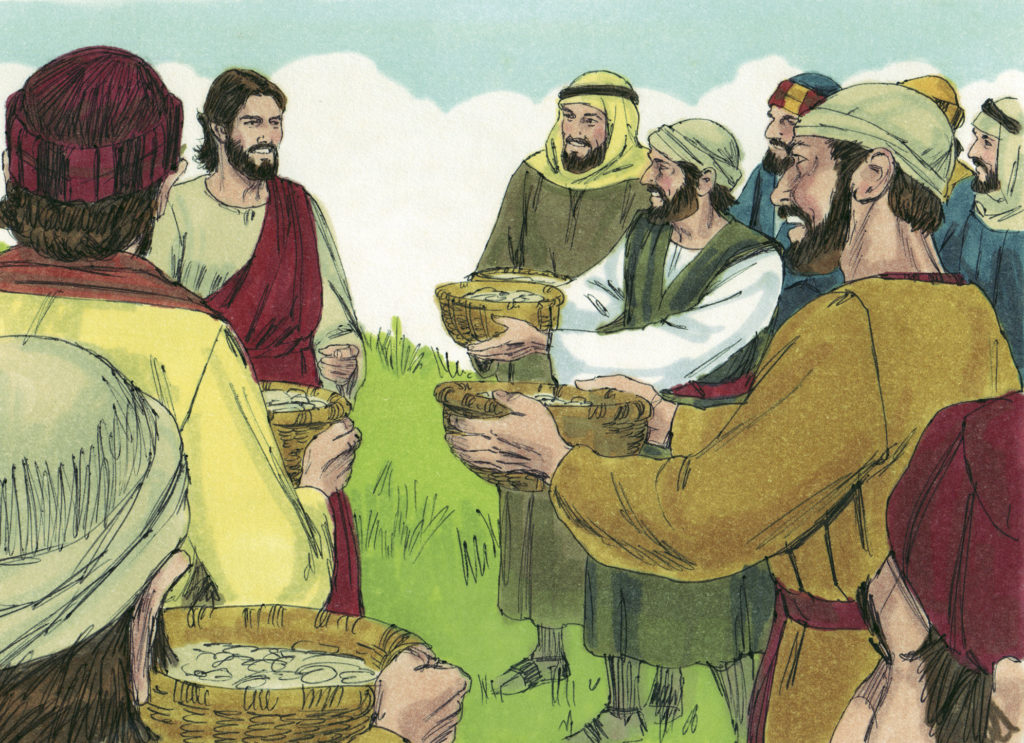THE LAST WORD

Jesus feeds the multitude (Mk 6: 34–44)
BY Silvano Fausti SJ | Biblist and writer
“HE LIFTED up His eyes to heaven, blessed and broke the loaves, and gave them” (6: 41). These are the words of the Eucharistic memorial (Mk 14: 22f), the point of arrival of every mission, in which we receive the bread which is the Son, and which makes us children of God.
This section of Mark wants to lead us to overcome deafness and blindness, in recognising the Lord in the Eucharist.
The continuation of this Gospel passage will be a comparison between the Church and this bread, culminating in the contemplation of a crucified God, object of the proclamation that makes us born again (baptism) and food that nourishes new life (Eucharist).
This passage begins by acknowledging the source of the Lord’s gift: His compassion, His hesed—the hidden essence of God, which will lead Him to give His life for us.
The scene takes place in the desert, where the people received the Ten Commandments, the manna, the quails and the water. Now the new people receive the Word itself, which becomes their nourishment and life.
The story puts in contrast two economies—two different ways of managing one’s existence: that of man, who lives on what he has or buys; and that of God, who lives and gives life in perfect gratuitousness. There is bread—the disciples have it and do not know it—that is multiplied by distributing it and that can satiate multitudes.
The story, called “multiplication”, actually speaks of sharing. This is how this satisfying bread comes into existence and suffices for all.
The central theme of the passage is “eating”. Eating means living. It is mysteriously true that the human being is what he or she eats. Biblical wisdom says: “Eat without money and without spending. Why do you spend money on what is not bread, your wealth on what does not satisfy? Come to me and listen, and you shall live” (Is 55: 1 ff passim).
The Eucharist is not the commemoration of a past event, but newness of life, filial and fraternal. “Whoever eats me shall live because of me” (Jn 6: 57), Jesus says. His bread is Himself, as He Himself is His Word: as Word He makes us see the mystery of God, as bread He makes us live it. In the background there is the memory of the exodus with the gift of manna and the miracle of Elisha (2 Kings 4: 42 ff).
Jesus, who gives word and bread, is Word and Bread. Living by Him, we live the fullness of life that has been promised to us.
The disciple eats of this bread. The banquet that Jesus prepares in the desert, very different from that of Herod in the palace, allows the person to pass from a dead existence—closed in selfishness and administered by the desire of possession, power and appearance—to a new life in love, under the sign of self-giving and of service in humility. The disciple now belongs to a new people, which has the characteristics of the bread they eat.
Five thousand is precisely the number of the primitive community (Acts 4: 4), of which is said that they lived in their daily life what they celebrated in their Eucharist.
| Dates To Remember |
|
April 2 – World Autism Awareness Day 4 – International Day for Mine Awareness and Assistance in Mine Action 6 – International Day of Sport for Development and Peace 7 – International Day of Reflection on the 1994 Genocide in Rwanda 7 – World Health Day 15 – Good Friday 17 – Easter Sunday 21 – World Creativity and Innovation Day 22 – International Mother Earth Day 23 – English & Spanish Language Day 24 – International Day of Multilateralism and Diplomacy for Peace 25 – World Malaria Day 28 – World Day for Safety and Health at Work 30 – Our Lady, Mother of Africa 30 – International Jazz Day May 1 – St Joseph the Worker, Workers’ Day 3 – World Press Freedom Day 8 – Remembrance and Reconciliation for Victims of Second World War 8 – World Migratory Bird Day 15 – International Day of Families 17 – World Telecommunication and Information Society Day 20 – World Bee Day 21 – World Day for Cultural Diversity for Dialogue and Development 22 – International Day for Biological Diversity 29 – Ascension of the Lord 29 – International Day of UN Peacekeepers 30 – World No-Tobacco Day |
